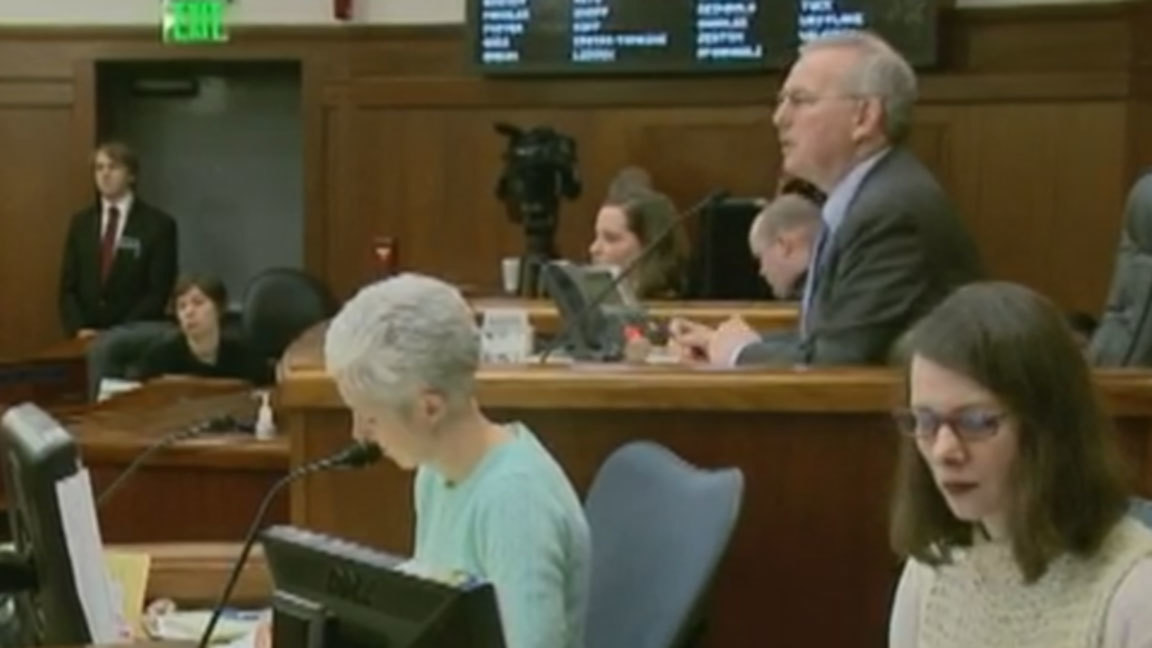Lawmakers are a quarter of the way through the constitutionally limited 121-day first session of the 30th Legislature, and they’re running well ahead of the pace set during the 29th Legislature — at least when it comes to new bills.
During the first session of the 29th Legislature, House lawmakers introduced 212 bills. Through the first 31 days of the 30th Legislature, they’ve introduced 132.
The Senate has added another 64.
The pace of new legislation picked up after dipping last week. Here’s what’s new in the Legislature:
HOUSE BILLS
HB 116 (Rep. David Eastman, R-Wasilla) — The state no longer has to spend 1 percent of public projects’ budgets on art.
HB 117 (Transportation Committee) — The state’s 1 percent for art program doesn’t apply to the two new Alaska-class ferries or the new Tustumena-class ferry under consideration.
HB 118 (Rep. Scott Kawasaki, D-Fairbanks) — Wrongfully imprisoned Alaskans can get health care and free tuition from the university as well as a cash payment if their wrongful imprisonment claim is upheld.
HB 119 (Gov. Bill Walker) — If the Alaska Industrial Development and Export Authority takes a big hit on an investment, its dividend to the state will be calculated differently.
HB 120 (governor) — If the attorney general gets involved in pipeline issues, the legal costs will be paid by a fee levied on the state’s utilities.
HB 121 (Labor and Commerce Committee) — The state commissioner of labor, instead of the Legislature, sets the maximum and minimum penalties for violating state labor laws.
HB 122 (Rep. Cathy Tilton, R-Wasilla) — A committee chairman can sponsor a bill on behalf of the committee only if the chairman first talks to every member of the committee.
HB 123 (Rep. Ivy Spohnholz, D-Anchorage) — Clinics and hospitals have to publish how much their most common procedures and services cost.
HB 124 (Rep. Sam Kito III, D-Juneau) — There can be such a thing as a “benefit corporation,” whose purpose is a public benefit.
HB 125 (Rep. Geran Tarr, D-Anchorage) — Lao and Hmong who served for the U.S. during the Vietnam War can get a veteran designation on their state-issued driver’s license or ID.
HB 126 (House Special Committee on Military and Veterans Affairs) — Members of the state militia are eligible for workers’ compensation if they’re injured on mobilization or during training.
HB 127 (Rep. Scott Kawasaki, D-Fairbanks) — Anyone who lost their Permanent Fund Dividend because of a criminal conviction can reapply for the dividend if their conviction is overturned.
HB 128 (Rep. Dan Ortiz, I-Ketchikan) — The state can allow shellfish hatcheries in the same way they authorize salmon hatcheries.
HB 129 (governor) — If someone has their hunting/fishing license revoked in another state, they can’t hunt or fish in Alaska. If you own a hunting/fishing license but don’t have it on you when wildlife troopers catch you, you can come back later with a copy of the license. You also can provide a digital form of the license instead of the paper one.
HB 130 (governor) — The borders of some of the state game refuges are redrawn to correct errors in the official description.
HB 131 (House Transportation Committee) — If the Department of Transportation has to tear down a building or move a house because of a construction project, the owner gets paid more money.
HB 132 (Rep. Adam Wool, D-Fairbanks) — Uber and Lyft can operate in Alaska.
HOUSE CONCURRENT RESOLUTION
HCR 6 (Rep. DeLena Johnson, R-Palmer) — The Legislature can’t work on other bills until it finishes its budget business.
HOUSE JOINT RESOLUTION
HJR 10 (Rep. George Rauscher, R-Sutton) — Congress should enact limits on the president’s ability to create national monuments.
SENATE BILLS
SB 56 (Sen. Cathy Giessel, R-Anchorage) — If a piece of heavy equipment breaks under warranty or within one year of purchase, the manufacturer has to provide a refund or replacement, including the cost of getting it to Alaska.
SB 57 (governor) — If the Alaska Industrial Development and Export Authority takes a big hit on an investment, its dividend to the state will be calculated differently.
SB 58 (governor) — If the attorney general gets involved in pipeline issues, the legal costs will be paid by a fee levied on the state’s utilities.
SB 59 (Sen. Bill Wielechowski, D-Anchorage) — Lao and Hmong who served for the U.S. during the Vietnam War can get a veteran designation on their state-issued driver’s license or ID.
SB 60 (governor) — If someone has their hunting/fishing license revoked in another state, they can’t hunt or fish in Alaska. If you own a hunting/fishing license but don’t have it on you when wildlife troopers catch you, you can come back later with a copy of the license. You also can provide a digital form of the license instead of the paper one.
SB 61 (governor) — The borders of some of the state game refuges are redrawn to correct errors in the official description.
SB 62 (Sen. David Wilson, R-Wasilla) — The state won’t regulate the number of hospitals and clinics through its “certificate of need” program anymore.
SB 63 (Sen. Peter Micciche, R-Soldotna) — You can’t smoke indoors in public workplaces.
SB 64 (Micciche) — A piece of environmentally contaminated property can be bought or sold as long as the sale includes a disclosure notice that stays with the property until it is cleaned up, regardless of how long that takes.
SENATE JOINT RESOLUTION
SJR 6 (Wielechowski) — Congress and the President should propose a U.S. Constitutional amendment to overturn the Citizens United decision.
Corrections: The previous version of this story conflated House Concurrent Resolution 6 and House Joint Resolution 10, sponsored by Rep. DeLena Johnson, R-Palmer, and Rep. George Rauscher, R-Sutton, respectively.
• Contact reporter James Brooks at james.k.brooks@juneauempire.com or 419-7732.

